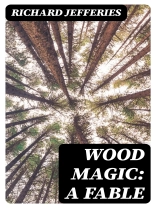In ’Wood Magic: A Fable, ’ Richard Jefferies crafts a richly detailed exploration of the natural world, intertwining themes of wonder, imagination, and ecology. Through lyrical prose that evokes a deep sensory connection to the woodland, Jefferies invites readers to engage with nature’s mysteries. His narrative style marries allegory with a vivid realism, as he illustrates the adventures of a boy who converses with woodland creatures, discovering both enchantment and wisdom in their perspectives. This work, emerging from the 19th-century context of the English pastoral tradition, offers keen insights into humanity’s relationship with nature, making it a pivotal text in ecological literature. Richard Jefferies, a noted English nature writer and philosopher, was profoundly influenced by his rural upbringing in Wiltshire. His intimate knowledge of the English countryside, combined with a preoccupation with the intersection of human experience and the natural world, informs the narrative’s depth and reflects upon his own struggles with urbanization and societal disconnection. Jefferies’ commitment to ecological consciousness and his reflections on the innocence of nature resonate throughout his prose. ’Wood Magic: A Fable’ is highly recommended for lovers of nature writing and those seeking a philosophical meditation on our interactions with the environment. Jefferies’ poetic vision not only celebrates the beauty of the natural world but also challenges readers to reconsider their place within it. This enchanting work serves as a timeless reminder of the magic that lies in the woods, urging us to reconnect with our surroundings.
Om författaren
Richard Jefferies, born John Richard Jefferies on November 6, 1848, in Coate, Wiltshire, England, remains a seminal figure in English nature writing. His oeuvre captures an almost transcendental appreciation of the natural world and rural life. Jefferies, a keen observer of the English countryside, began his career as a newspaper reporter but soon found his calling in literature, weaving together nature observation with elements of philosophy and fantasy. ’Wood Magic: A Fable, ’ one of his notable works, exemplifies his talent for infusing the English landscape with a sense of wonder and magic. This book, alongside others such as ’The Story of My Heart’ and ’After London, ’ illustrates his unique literary style that combines detailed descriptions of nature with a narrative that borders on the mystical, offering a precursor to modern environmental literature. Despite struggles with illness throughout his life, Jefferies’ writings left an indelible mark on the genre, influencing subsequent generations of nature writers. He died at an early age of 38 on August 14, 1887, but his work continues to be celebrated for its lyrical quality and prescient environmental concerns.












